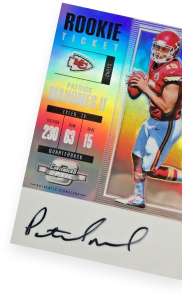Konami blasts Upper Deck in statement on settled Yu-Gi-Oh! counterfeiting case
![]()
By CHRIS OLDS | Beckett Baseball Editor
Konami issued its first public statement on Wednesday following the settlement of its long-running dispute with Upper Deck over the Carlsbad, Calif.-based trading card company’s unauthorized production of more than 600,000 Yu-Gi-Oh! trading cards.
The case was settled before the second day of a trial could begin in a U.S. District Court in Los Angeles last week. Konami was seeking hundreds of millions of dollars in damages after a judge found that Upper Deck did, indeed, make unauthorized counterfeit cards that were distributed via repackaged products.
Upper Deck opted to settle and was due to make its first multi-million-dollar payment (specifics of the settlement were confidential) on Friday. It’s a case in which a New York Post story says has fueled “widespread speculation that this case could severely hurt its financial health. Some believe [Upper Deck] is on the brink of bankruptcy.”
Konami’s release on Wednesday included both comments from Upper Deck’s attorney as well as its company officials — a sharp contrast to UD’s statement issued last Friday.
“At this point, Upper Deck doesn’t have a lot of Life Points. We’re talking about behavior that, from a defense attorney’s standpoint, I can’t defend and I am not going to defend,” said attorney Richard Howell, of Rutan & Tucker, who represented Upper Deck during the trial. “I’m here defending a counterfeiter. And now I have to deal with that issue.”
Konami also addressed Upper Deck’s statement — and offered its view on UD’s credibility in the marketplace.
“This entire situation came as a huge shock to us. As a company that has based their entire business model on producing authentic entertainment and sports licensed products, Upper Deck went against their very core beliefs by counterfeiting Yu-Gi-Oh! TCG Cards,” said KDE’s Vice President of Card Business Yumi Hoashi. “It was very disheartening to learn that a trusted business partner would take these actions to dupe us and the Yu-Gi-Oh! TCG community.
“As a leading company in this card industry, Upper Deck should have known more than well that counterfeit activities would irreparably harm the trust of Duelists and the integrity of the Yu-Gi-Oh! brand.”
Konami’s statement continued, reading: “The cover-up included a meeting in the office of Upper Deck’s chairman, in which he and at least one other Upper Deck employee compared samples of authentic Yu-Gi-Oh! TCG cards against fakes made by Upper Deck, and shredded the samples in the chairman’s office, as well as an e-mail from an employee of Upper Deck to other employees asking to provide her information on how to obtain Yu-Gi-Oh! TCG security foils ‘in secrecy.’
“Following almost one full year of court proceedings, Upper Deck finally admitted to having printed in China and importing to the U.S. hundreds of thousands of bogus Yu-Gi-Oh! TCG cards. Mr. Howell of Rutan & Tucker noted in the opening statement to the jury: ‘The behavior is still undeniably wrong. And I am in here, as counsel for the two defendants, asking you to hold my clients accountable for that behavior; asking you to hold my clients responsible for this conduct that there is no dispute, and there was no disputing even before this case started today, that it was wrong.'”
The Konami release comes in sharp contrast to Upper Deck’s public statement on the matter, which touted its building of a “a solid foundation on which Yu-Gi-Oh! will benefit for years to come” and that it was “pleased to announce that it has come to a successful resolution.” It also included a comment from Upper Deck CEO Richard McWilliam.
“Though we are delighted that Konami was finally forced to see the light regarding its claims, there is, of course, a bittersweet side to the ending of this dispute,” McWilliam said. “During the six years we spent building the Yu-Gi-Oh! brand we formed strong ties to the playing community, and, in the end, they are the ones that suffered most because of this lawsuit. Instead of focusing on the merits of the case, Konami focused its efforts on pursuing exaggerated claims and damages which it could not establish in the courtroom.”
Chris Olds is the editor of Beckett Baseball and Beckett Graded Card Investor. Have a comment, question or idea? Send an e-mail to him at colds@beckett.com.




So…where’s the second page of this story? It ends just as you’re getting warmed up!
Here’s Upper Deck’s full statement from last week:
http://www.upperdeck.com/marketing/news_article.aspx?aid=7451
The more I hear about this issue the more it sickens me. What other kind of shady practices is Upper Deck doing? Can we trust that those jersey and auto cards are in fact authentic? Just downright dispicable and now the MLB nonsense. Who’s running that monkey farm?!
i’m still wondering why Upper Deck printed these fakes in the first place? What were they intending to do with them? If UD had the license for the product who cares where there printed? Was it a scam by people inside the company to make a little extra money? And extactly how did this printing of cards in China hurt? Was there a stated print run already? Can anyone make any sense of this. WHY
They were made to be sold in repackage packages (a bonus card on top of/along with old packs) through Vintage, which UD has a business interest in.
You can download the PDF that details all of Konami’s complaints at the end of the story found here: http://blogbeckett.wordpress.com/2010/01/26/upper-deck-konami-trial-could-be-settled-before-trials-second-day-begins/
just shocking, wait no, I mean the usual… Well from upper deck lately. The sad thing is that all collectors lose from stories from this. I wish ud knew what the effect of this is on kids. It’s just really a sorry state of affairs.
[…] Card Investor. Have a comment, question or idea? Send an e-mail to him at colds@beckett.com. Konami blasts Upper Deck in statement on settled Yu-Gi-Oh! counterfeiting case The Beckett Blog __________________ Shop for Sports Cards and Trading […]
LOVE the UD quote–yes, the consumers are the ones who suffered the most because they were buying COUNTERFEITED cards that UD made and sold as being legit.
“During the six years we spent building the Yu-Gi-Oh! brand we formed strong ties to the playing community, and, in the end, they are the ones that suffered most because of this lawsuit. Instead of focusing on the merits of the case, Konami focused its efforts on pursuing exaggerated claims and damages which it could not establish in the courtroom.”
Ah, remember the good old days when you only had to worry about getting counterfeits on the secondary market.
UD could benefit from all of this legal trouble
look for 2 trial used relics in each box!!
UDE>Konami all the way